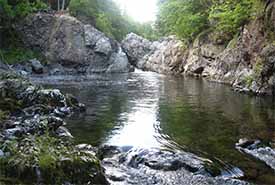Riverside-Albert

Stream on Riverside-Albert Property (Photo by NCC)
In the southeast corner of New Brunswick, between the village of Riverside-Albert and the Caledonia Gorge Provincial Protected Natural Area, is a spectacular old forest protected by the Nature Conservancy of Canada (NCC). This 220-hectare nature reserve is an excellent example of a diverse Wabanaki (Acadian) forest. It includes mature red spruce, sugar maple, red maple and yellow birch. Most of the trees on the nature reserve are more than 80 years old.
NCC prioritized this forest for conservation because it’s so rare. Less than five per cent of mature Wabanaki (Acadian) forest, the original forest type of the Maritimes, remains intact due to centuries of settlement and harvesting. Old forest in this part of the province provides a haven for wildlife, including two birds listed under the Species at Risk Act: chimney swift (threatened) and eastern wood-pewee (special concern). Provincially rare plants, such as lesser, purple-fringed orchid and Braun’s holly fern, can be found here.
Project history
This conservation project is the result of a remarkable collaboration. While searching for old forest to protect, NCC staff observered water reservoirs for the Village of Riverside-Albert. The water was provided to residents under a 100-year “water lease,” which was about to expire. NCC staff met with the landowner, then the village, to work out an arrangement that would benefit everyone. With the help of multiple partners, the land was secured for the conservation of both the forest habitat and the water supply. It was a win-win-win for NCC, the community and nature.
NCC began working with village staff in 2017 to discuss opportunities for the long-term conservation of the lands surrounding their water supply. NCC staff brought experience in negotiating purchase agreements with private landowners, as well as ability to leverage funds to purchase land for conservation. The staff and elected council of the Village had community knowledge and support, and a clear vision for securing the future of their drinking water supply. The first property purchased by NCC contained drinking water reservoirs and related infrastructure. Ownership of nine hectares immediately surrounding the reservoirs was transferred to the Village of Riverside-Albert for control and management of the water supply. In collaboration with the Government of New Brunswick’s Nature Legacy initiative, additional purchases of private lands and the nomination of Crown lands as candidate conserved areas has since expanded the current and proposed conservation areas to cover 70 per cent of the drinking water watershed. Conservation can help meet municipal needs through nature-based solutions: solutions that make use of natural features and processes to address challenges such as climate change, water security, water pollution, food security, human health, biodiversity loss, and disaster risk management.
“We are very pleased to be working once again with the Nature Conservancy of Canada on this new conservation project which will have great benefits for the residents of our village. This project is crucial to securing the necessary quantity and quality of drinking water for our residents for decades to come.” – Jim Campbell, Mayor of Riverside-Albert
With your generous support, we can continue to protect mature forest and care for this unique landscape that will benefit both people and wildlife. If you would like to help conserve one of the Maritimes' few remaining old Wabanaki (Acadian) forests, please call our New Brunswick office at 506-450-6010 or 1-877-231-4400.
Partners in conservation
Listen to our podcast and transport yourself to this important natural area. Learn about NCC’s conservation work here:





